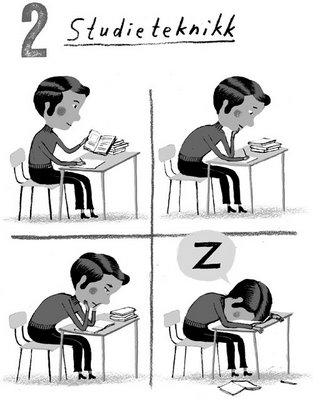Dr. Frank G. Nelson husker vi som leder for engelskkurset på Konnerudkollen. Han har skrevet en artikkel om ovenfor nevnte emne, vi tillater oss å ta med noen klipp fra denne. Disse serveres her i en noe «bearbeidet» form.
This little guide may help you avoid some of the common mistakes which so often make the study a tragic waste of time instead of an exciting intellectual adventure. But in the last analysis everything depends upon the mental attitude with which you approach the subject, upon your ability to do some creative thinking as well as memorize what someone else has said. Mere diligence is not enough.
“Meek young men” says Emerson, “grow up in libraries believing it is their duty to accept the views which Cicero, which Locke, which Bacon have given; forgetting that Cicero, Locke , and Bacon were only young men in libraries when they wrote these books”.
The physical conditions of study
The ancients held up as an ideal a sound mind in a sound body, today we realize that mental health is often dependent upon physical health. You cannot do your best if you suffer from fatigue or strain. Living conditions are far from ideal in Oslo, but you can do much to keep in trim if you want to, and a few hours in Nordmarka in the middle of the week as well as on Sunday will increase your efficiency a hundred percent. After all, it is not how many hours you spend over your books that counts but how much you learn in each hour you study.
These simple rules will help reduce the physical strain of study to a minimum:
- Never read more than six hours a day, especially during those last critical weeks before the examination. Eye strain and fatigue set in after that and you will discover – if you are honest with yourself – that nothing you read sticks in your memory. If you wish to put in an eight hour-day, spend the other two hours attending lectures or discussion groups.
- Rest your eyes by looking up from the book every ten minutes for thirty seconds or so. Clear you brain by getting up and stretching your legs at least once an hour. Break the day by at least one trip out in to the fresh air for an hour or so, and if possible read one book before you go out and one after you come back to vary the monotony.
- Apply the principles of repetition and spaced learning. Instead of memorizing each page as you go and then putting the book aside forever, read the entire book or chapter through rapidly, noting the main points. Then lay it aside for a while and pick up another, and then go back to the first book again, repeating the process half a dozen times if necessary.
- Make yourself as physically comfortable as possible, with a good light and the easiest chair you can find. Then if the book bores you, it is probably the fault of the book. If you can find a quiet place to study at home, don’t haunt the reading room; someone else needs the spade in the reading room desperately, and experiments have shown that we actually concentrate better with our collars unbuttoned and our shoes off.
- Learn team work. You get twice as much out of a book if you discuss it with a group of friends, checking what you think the main point is against what they have gotten out of it. You may find, to you surprise, that you have been missing the obvious.
- Be an active student – if only for materialistic reasons. The people you meet at the Socialøkonomisk forening and in Fredriksgt. 3, the ones you work with in Fagutvalg or who read your articles in Stimulator and Universitas are the ones who will some day be Byråsjef a.s.o., and they will not be impressed if they learn that you were at the University at the same time they were but were so buried in your books that they never knew you existed.
- Finally, remember that the most important things in your university career are not in you books at all. Keep alive to the stimulus of your friends and instructors, know what is happening in the world of art, music and the theater, and take an active interest in politics and social problems. And don’t forget the opposite sex entirely. Or when you have finished your studies you may discover that you have forgotten how to live.
